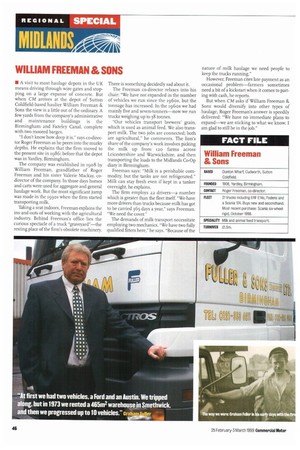WILLIAM FREEMAN & SONS
Page 48

If you've noticed an error in this article please click here to report it so we can fix it.
• A visit to most haulage depots in the UK means driving through wire gates and stopping on a large expanse of concrete. But when CM arrives at the depot of Sutton Coldfield-based haulier William Freeman & Sons the view is a little out of the ordinary. A few yards from the company's administrative and maintenance buildings is the Birmingham and Fazeley Canal, complete with two moored barges.
"I don't know how deep it is," says co-director Roger Freeman as he peers into the murky depths. He explains that the firm moved to the present site in 1986; before that the depot was in Yardley, Birmingham.
The company was established in 1908 by William Freeman, grandfather of Roger Freeman and his sister Valerie Mackay, codirector of the company. In those days horses and carts were used for aggregate and general haulage work. But the most significant jump was made in the 19305 when the firm started transporting milk.
Taking a seat indoors, Freeman explains the ins and outs of working with the agricultural industry. Behind Freeman's office lies the curious spectacle of a truck "graveyard"—the resting place of the firm's obsolete machinery. There is something decidedly sad about it.
The Freeman co-director relaxes into his chair: "We have not expanded in the number of vehicles we run since the 19605, but the tonnage has increased. In the 196os we had mainly five and seven-tonners—now we run trucks weighing up to 38 tonnes.
Our vehicles transport brewers' grain, which is used as animal feed. We also transport milk. The two jobs are connected; both are agricultural," he comments. The lion's share of the company's work involves picking the milk up from 120 farms across Leicestershire and Warwickshire, and then transporting the loads to the Midlands Co-Op diary in Birmingham.
Freeman says: "Milk is a perishable cornmodity, but the tanks are not refrigerated." Milk can stay fresh even if kept in a tanker overnight, he explains.
The firm employs 22 drivers—a number which is greater than the fleet itself. "We have more drivers than tucks because milk has got to be carried 365 days a year," says Freeman. "We need the cover."
The demands of milk transport necessitate employing two mechanics. "We have two fully qualified fitters here," he says. "Because of the nature of milk haulage we need people to keep the trucks running."
However, Freeman cites late payment as an occasional problem—farmers sometimes need a bit of a kicicstart when it comes to parting with cash, he reports.
But when CM asks if William Freeman & Sons would diversify into other types of haulage, Roger Freeman's answer is speedily delivered: "We have no immediate plans to expand—we are sticking to what we know. I am glad to still be in the job."
















































































































